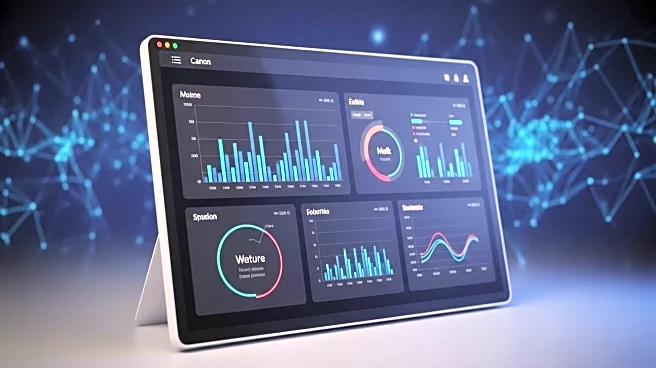What's Happening?
Shopify has unveiled a suite of practical reporting tools designed to assist small businesses in managing and analyzing their data more effectively. These tools aim to simplify the process of data visualization and reporting, allowing businesses to monitor key performance indicators (KPIs) crucial to their operations. The tools integrate data from various sources, including customer purchase history, social media interactions, and website engagements, to generate comprehensive reports. This initiative is part of Shopify's broader effort to empower businesses with user-friendly analytics capabilities, enabling them to make informed, data-driven decisions. The reporting tools offer features such as predictive AI, drag-and-drop functionalities, and customizable dashboards, catering to both tech-savvy users and those less familiar with data analysis.
Why It's Important?
The introduction of these reporting tools is significant for small businesses as it democratizes access to advanced data analytics, traditionally reserved for larger enterprises. By providing these tools, Shopify is enabling small businesses to leverage big data insights without requiring extensive technical expertise. This can lead to improved business performance, as companies can quickly identify trends, optimize operations, and enhance customer engagement based on accurate data. The ability to generate timely and customized reports allows businesses to focus on strategic areas, potentially increasing revenue and customer satisfaction. Furthermore, the integration of AI-driven analytics offers predictive insights, helping businesses anticipate market changes and adjust strategies accordingly.
What's Next?
As small businesses begin to adopt these reporting tools, there may be a shift towards more data-driven decision-making across various industries. Shopify's initiative could prompt other platforms to develop similar tools, increasing competition in the analytics space. Businesses might also explore additional integrations with other data sources to further enhance their reporting capabilities. The focus on user-friendly interfaces suggests a trend towards simplifying complex data processes, making advanced analytics accessible to a broader audience. This could lead to increased innovation in the development of reporting tools, with more emphasis on automation and AI-driven insights.
Beyond the Headlines
The ethical implications of using AI in data reporting tools are worth considering, particularly in terms of data privacy and security. As businesses rely more on AI for decision-making, ensuring the protection of sensitive customer data becomes paramount. Additionally, the cultural shift towards data-driven strategies may influence how businesses operate, potentially leading to changes in organizational structures and roles. The long-term impact of these tools could also include a greater emphasis on transparency and accountability in business operations, as data becomes a central component of strategic planning.









